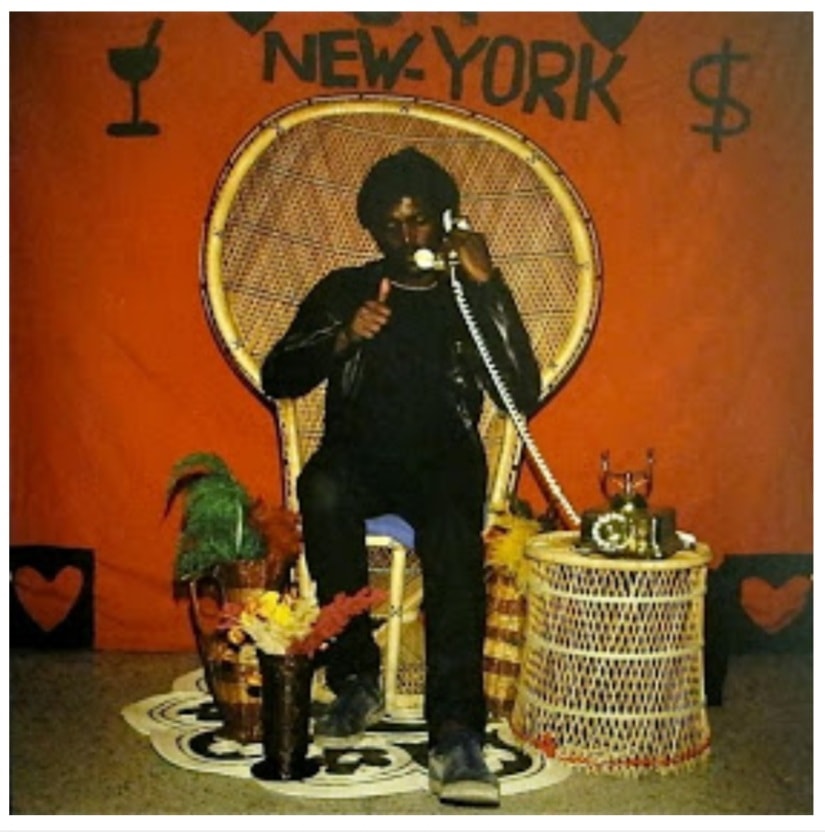An examination of American history’s most pressing questions….
When historians are developing inquiry, we will often ask, “What questions in this era were people trying to answer? and “What questions do we as historians have when we try to understand this era?” In this article, I strive to answer these questions in examining the timeline from the end of WWII through til today. Additionally worth noting, this essay was also written bearing in mind that I’m a history teacher and developing inquiry is important both as a historian and as an instructor.
What questions were people in this era trying to answer?
Post-WWII, Beginning of Cold War
After WWII, the United States and the USSR emerged as world powers. Not only did they have the largest militaries, but also politically, economically, and geopolitically. The two nations had a long, adversarial relationship, but after WWII, the ideological conflict between capitalism and communism put these two nations at complete odds with one another. Leaders and diplomats of the two nations were most likely asking, How can we serve our nation’s interests on the world stage?
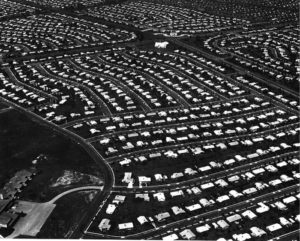
A Levittown Community, http://ushistoryscene.com/article/levittown/.
According to Eric Foner, Winston Churchill proclaimed an “iron curtain” had fallen on Europe, dividing the “free” West and Communist East. And while the first proxy wars had already begun in Greece and China in 1946, it wasn’t until the Truman Doctrine of 1947, that the U.S. embraced the Cold War as a foreign policy initiative. Americans of this era were asking, How do we protect our free market? How will the tyranny of Communism threaten our freedoms? Geopolitically, the U.S. declared itself an arbiter of liberty and democracy. And with the formation of NATO and the United Nations, they had the backing of other capitalist countries.
The 1950’s were a time of affluence and anxiety. The task of rooting out communism around the world also bled into American domestic life. While the nation was in a good place economically, the surveillance state was coming to form, as people were targeted for holding communist sentiments. The FBI, CIA, employers, landlords, friends and family… every facet of American society was coming into question, people asking, Who is harboring communism in our midst?, attempting to root out the political ideology from the American fabric. Those targeted were clearly being discriminated against.
Not only were leftists singled out, but LGBTQ individuals, artists, people in the entertainment industry, Black people, Latin Americans, and people in academia. As a result, people were fired from their jobs, denied loans, arrested arbitrarily and in the case of Ethel and Julius Rosenberg, executed. Even prominent Civil Rights leaders like Martin Luther King Jr. were targeted during the second Red Scare. Those scapegoated were most likely asking, How can I be free to vocalize my dissent without being victimized? What can I do to avoid suspicion that I’m a communist? Am I being spied on? The domestic paranoia of McCarthyism, in relation to geopolitics and the U.S. becoming the “leader of the free world,” reveals the nation’s paradoxical relationship with the idea of freedom in a very thematic way. It harkens us back to the Founders’ conundrum.
Domestic Culture and Social Dynamics
The 1950s and 60s brought a dramatic shift in cultural and social dynamics in the U.S., that resulted in generational conflict, racial integration and sexual liberation. Because of the post-war economic boom, by the 1950s, families had twice as much real income than in the 1920s. This gave rise to the formation of suburbs and an increase of dependance in the automobile. This put physical distance between where a man worked and where he resided. After the war, women were pushed back into domestic roles. People asked, What is the American dream? This also put to question, What is the role of women in the family? What is the role of women in society?
The formation of suburbs also led to housing discrimination and segregation. The perfect example of this are the Levittown neighborhoods. White families of these neighborhoods asked, Who do we want to live in our town? Black families may have been asking, Why are we continually denied the same rights and freedoms as whites? After the murder of Emmett Till in 1955, tensions were running deep as the Civil Rights Movement began to take form.
While there may have been violence and discrimination in many domestic and systemic ways, there was one space that was integrated; the music scene. That’s not to say that there wasn’t racism within the music industry, because there were certainly abundant examples, but music venues and fans challenged segregation thus creating a generational rift between Baby Boomers and the “Greatest Generation.” White parents were asking, How will I protect my child from the corruption associated with rock ‘n’ roll music? Indeed, rock ‘n’ roll and RnB were the antithesis of dominant white culture and represented a counterculture movement; Black artists paved an artistic frontier, centered on freeing the mind, body and soul.

Anti Rock ‘n’ Roll Propaganda, https://youtu.be/Npm5vxharc4.
With that said, the music certainly reflected the political and social dynamics of the time; liberation. In 1954, Brown v. Board was the landmark case that determined racial segregation of schools in the South went against the Constitution. There was backlash and resistance to the tides of change in music, just as there were in Civil Rights measures. People who believed in equity and Black freedom asked, How will we combat white supremacy and confront “the Man?” Artists, and poets known as “hipsters and beatniks,” of diverse backgrounds, lived amongst each other in enclaves, particularly in Northern cities. There, they nurtured this artform as they whispered talks of revolution.
Black Civil Rights Movements and Pan-Africanism
As the nation transitioned into the 1960s, the Black Civil Rights movement began to gather speed. People were asking, How will we finally be recognized as full citizens under the law? How can we use nonviolent resistance to achieve our goals? Is nonviolence the only way to combat white supremacy? Black freedom fighters marched to Washington and asked, When will we see our neighborhoods and schools safe from police brutality, segregation and discrimination? Black nationalist movements sprung up all over the country, the most famous being the Black Panther Party which began in Oakland, CA. They asked, How will we assert ourselves to the white man? Do we need integrated unity to achieve our goals? How can we protect and serve our communities in the way that cops have failed to do? As the Black Civil Rights movement was occurring, simultaneously, African nations were in a process of decolonizing and reasserting their claim to their land and life. People of the African diaspora were asking, How can we support the global initiative for Black human rights?
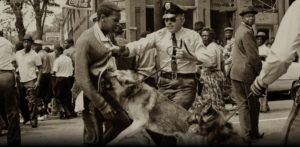
The Birmingham Campaign Protests, https://civilrightstrail.com/timeline/.
Anti-War and New Conservatism
Nearly three decades into the Cold War, and the Vietnam War being one of the proxy wars, people were growing tired. The anti-war movement protesters of the late 1960s were asking, What is war good for? The popular song by Edwin Starr in 1970 answered, “absolutely nothing.” After the election of Richard Nixon, a new phase of government was entering the political ring and would define modern America in many ways. Nixon’s administration did give way to many new government programs and he was the president to put an end to the Vietnam War. However, other policies such as the War on Drugs systematically targeted minorities and not to mention he was entrenched in the Watergate scandal. The House and Senate were asking, Were Nixon’s actions an impeachable offense?
In addition to Nixon, other interest groups and Evangelical Conservatives were entering the fight. Roe v . Wade was a landmark case in 1973 that gave women the right to terminate a pregnancy in the early trimesters, thus giving women the right to physical autonomy. Homosexuality was also removed from the DSM-4 and these Conservative interest groups actively opposed these progressive measures. People asked, Should the government have a say whether a woman gets to have an abortion? How can we express my freedoms when there’s so much in the world that goes against my religion? Do I have an active responsibility to prevent these measures from corrupting our nation? People who opposed these Conservative groups were asking, How will I express my freedom of choice to live the way I want to, love who I want to love and do what I want with my body without someone imposing their will on me?
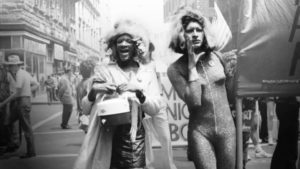
Other than Jimmy Carter’s presidency, the 70’s-early 90’s were dominated by Conservative politics and it shaped the political landscape. Reagan’s economic policy moved Democratic rhetoric further to the right as the country had a brief time of political ambiguity. This would be short-lived, but from about 1981 to about 2007, there wouldn’t be any extreme differences between Democrats and Republicans. Even Clinton Democrats of the 90s were considered moderate and centrist. During this time, people were asking, How do we adjust to a globalized economy?
Post-Cold War-Today
One of the moments that marks the end of the Cold War, the tearing down of the Berlin Wall, occurred about two weeks before my birthday. I was much too young to pay attention to Clinton-era politics, though I do remember events such as the Oklahoma City Bombing and the Columbine shooting as people were asking, Do we have an issue with domestic terrorism? I distinctly remember the year I became civically engaged, and it was with the election of George W. Bush in 2000. He hadn’t won the popular vote as people asked, Is the electoral college a fair process for electing the President? This question would come up again.
While my civic engagement at that time, mostly consisted of casually watching The Daily Show With Jon Stewart and The O’Reilly Factor with my uncle when he visited from New York City, it was on 9/11 that I started to really pay attention. All forms of domestic life was put to a halt that day as people were asking, How are we going to collectively heal from this national trauma? George W. Bush’s answer was to continue to conduct business and “go shopping.” I remember watching his Presidential Conference on October 11, 2001 and being disgusted. Bush was claiming in that statement, the terrorists were threatening our freedom to consume. His disastrous response to New Orleans in the wake of Hurricane Katrina, his invasions of Afghanistan and later Iraq would be other critical moments in his presidency where people finally had had enough of Conservative politics. They needed a change.

The 2008 election was the first time I was old enough to vote and I remembered crying tears of joy at the ballot box because I knew I was a part of history, voting for the first Black President. Regardless of my current-day criticisms of him as a President and my frustrations with the Democratic party as a whole, that was a historic moment. People were asking, Is Barack Obama going to be the arbiter of change? The answer to that was yes, but maybe not in the way that we expected him to be. People became more polarized in their political and belief systems, the more we hear from the “other side,” the more we can’t stand what they have to say. And the feeling is mutual. Many attribute this as a racial backlash to seeing a Black man in office, and that claim may hold some water.
Today, there are a flurry of questions, streaming at a rapid rate, as all of us are connected and plugged into multiple devices, bringing us all together through a variety of platforms. There are many reasons why Trump came into the Office of the President. It’s taken me the entire four years of his first term to suss it out. The list is long, so I’ll spare you. In any case, the questions that we have left unanswered are, Is the government responsible for providing healthcare and higher education? Can we trust law enforcement? Is it inherently unethical to be a billionaire? Are border and immigration policies, and the way they are enforced, violating human rights? What can we do about manufacturing jobs being sent overseas? Are we going to survive climate change?
What questions do we as historians have when we try to understand this era?
Post-WWII, Cold War
When examining the late 1940s-early 1960s, historians are asking questions from a variety of perspectives. We ask, How did WWII shift social and political dynamics? Why did the notion of being a teenager emerge at this time? Why did parents hate rock ‘n’ roll so much? How did rock ‘n’ roll’s relationship with sexuality carry us into the “free love” movement of the late-1960s?
When examining racial dynamics we ask, How do federal court cases change our relationship with freedom? Does a law matter if no one enforces it? When analyzing domestic Cold War paranoia, we can ask, Did the fear of communism supercede protecting the right to privacy? What happens to a society motivated by fear of one another? Is capitalism an American tenant? Upon looking closer to the notion of affluence and anxiety, we ask, Why did white families move to the suburbs? How did the construction of highways further propel de facto segregation? How did the murder of Emmett Till, and lynchings more broadly, bring forth a wave of resistance?
When expanding our inquiry on the Cold War, we ask, What are the real-world repercussions to an ideological war? When did the Cold War officially start and end? Why were so many people assassinated in the 1960s? Why do people fear communism? What is the true relationship between the United States and the USSR (later Russia)? What was the role of the CIA in facilitating to quash communism around the world?
Civil Rights Movements and Pan-Africanism
One of the most important questions to ask when inquiring about Black Civil Rights is, How was the Civil Rights Movement a culmination of almost 400 years of resistance? It’s vital for us as historians to see the fight for Black human rights more holistically when we’re examining the histories of the African diaspora. Additionally, it’s important to ask, How did Black American Civil Rights and African decolonization influence one another? When we see it as a worldwide movement, it reveals just how revolutionary this time was.
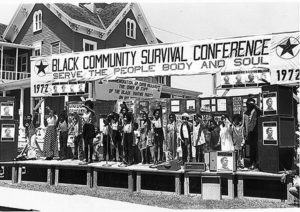
Understanding the diverse ways that leaders approached the matter also reveals to us that there was no single strategy, the Black community is not a monolith. Therefore we need to ask, What were the different ways Black leaders went about obtaining their goals? How did Black Civil Rights rhetoric differ? What is it about Black nationalism that stokes fear in whites?
Anti-War and New Conservatism
When we inquire about the Vietnam War, we are asking, How long has Vietnam been warring before the U.S. decided to intervene? Was the Vietnam War a “bad” war? Looking at other social movements that spawned from Black Civil Rights, we ask, How were feminists, the LGBTQ community, people with disabilities and the anti-war movement influenced by Black Civil Rights? How were social groups influenced by the Vietnam War? What were the traits of the counterculture movement? How did music and entertainment of the 1960s take a political stance? This then propels us as historians into the 1970s as we ask, Why was there a surge of conservatism in the 1970s-today? Is there a relationship between conservatism in the 1970s and today’s political climate?
Post-Cold War-Today
As I said earlier, as we inquire about the last thirty years, we are left with many questions unanswered. However questions like, How did the U.S. economy and social dynamics shift as a result of NAFTA and globalized economies?, are measurable. Other questions of our era don’t seem to be as clear-cut as people continue to analyze, Was the War on Terror a fruitless war? Is our freedom to privacy being violated by the NSA? How has the Age of Information impacted our society?
What changed after Obama’s presidency? What will change as a result of Trump’s presidency? How is American nationalism stoking racism and domestic terrorism? Does the role of government include protecting the right to access to clean water? How much regulation needs to be imposed on multinational corporations, tech giants and billionaires? Is capitalism an inevitable failure?
